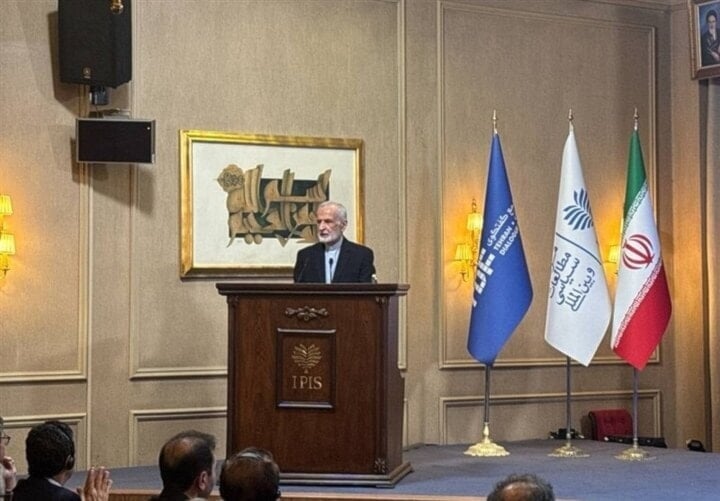Iran open to US talks but rejects pressure, coercion: Kharrazi
A senior advisor to the Leader of the Islamic Revolution affirms Iran's readiness to negotiate with the US but says talks must be based on equality, not coercion or economic pressure.
-

Kamal Kharrazi, president of the Tehran-based Strategic Council on Foreign Relations (SCFR), addresses the International Law Under Attack: Aggression and Defense international conference in Tehran, Iran, November 16. 2025 (Mehr News Agency)
Iran has always sought negotiations and conveyed to US President Donald Trump that peace cannot be imposed by force, said Kamal Kharrazi, a senior advisor to the Leader of the Islamic Revolution.
"We are not running away from negotiations," said Kharrazi, president of Iran's Strategic Council on Foreign Relations (SCFR), in a speech on Sunday while addressing an international conference titled “International Law Under Attack: Aggression and Defense” in Tehran.
The advisor to Iran's Leader added, "However, we are not prepared to negotiate under pressure from force of weapons and criminal actions."
"Therefore, my advice to Trump is to adopt a positive approach and show his readiness to negotiate based on equality and mutual respect. Then, he will see what the results will be," Kharrazi stressed.
He also said that the US president "must also know that we will not stop enriching [uranium] that is for peaceful purposes, nor will we give up our defense power, nor our independence."
"Iran has always shown that it is ready to negotiate, but a negotiation based on the principle of equality and mutual benefits. The problem is that the Americans are not ready for such negotiations. They want to advance their illegitimate goals by relying on economic pressures. This method is rejected, and the Iranians stand against bullying," he concluded.
West ups pressure, Iran takes it head-on
In November 2025, Western governments, specifically the E3 countries, introduced a new draft resolution at the International Atomic Energy Agency (IAEA), intensifying their pressure on Iran over its nuclear program.
The draft, which is expected to be discussed during the upcoming IAEA Board of Governors meeting, criticizes Iran for failing to provide credible explanations regarding traces of enriched uranium found at undeclared sites. It urges Tehran to suspend its uranium enrichment, heavy-water activities, and research and development projects until full compliance with IAEA safeguards can be verified.
The IAEA’s governing board has twice passed resolutions condemning Iran’s lack of cooperation, most recently in June 2025, when the board formally claimed that Iran’s failure to explain undeclared nuclear material and activities constituted a breach of its safeguards agreement. Meanwhile, it has yet to officially condemn the joint Israeli-US attacks on nuclear facilities in Iran.
Beyond nuclear-oversight measures, Western powers have already reimposed UN sanctions on Iran by activating the snapback mechanism under UN Security Council Resolution 2231. In August 2025, the UK, France, and Germany formally triggered the process, citing Iran’s significant violations of its nuclear commitments.
In parallel, Tehran has responded with defiance against attempted hegemony: the Iranian parliament approved a bill to suspend full cooperation with the IAEA, and Iranian officials rejected the Western-backed IAEA resolution as politically motivated and “illegal". In effect, the standoff is deepening: the West is applying means of diplomatic, legal, and economic pressure; Iran is resisting by denying unfettered access and continuing enrichment for peaceful purposes.

 3 Min Read
3 Min Read










